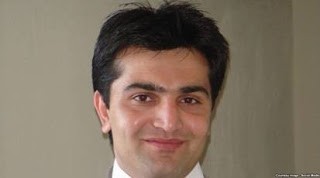Tale of Two Professors
Hamid Hussain
“The tragedy is not that things are broken. The tragedy is that things are not mended again.” Alan Paton; Cry, the Beloved Country
The story of Assistant Professor Hamid Hussain of Pakistan and Assistant Professor Naqib Ahmad Khpulwak of Afghanistan is another sad chapter of the unending violence plaguing the region. On 20 January 2016, militants attacked Bacha Khan University in Khyber Pukhtunkwa (KPK) province of Pakistan killing twenty two and wounding twenty others. Among the dead was Hamid who died at the prime of his youth while trying to protect his students. He left behind a young widow and two children. He died ten days after celebrating his son’s third birthday. Hamid hailed from a village in Swabi in Khyber Pukhtunkwa (KPK). He was a bright student and after graduating from local college, he obtained his masters from University of Peshawar. He earned a higher education scholarship and completed part of his PhD in organic chemistry from Bristol University in England. Chemistry was his passion and he came back to Pakistan to teach at Bacha Khan University.
Figure: 1: Assistant Professor Hamid Hussain
On August 24, 2016, militants attacked American University of Afghanistan in Kabul killing sixteen and wounding thirty six. Among the dead was Assistant Professor at Department of Law Naqib Ahmad Khpulwak. Naqib hailed from Jalalabad, Afghanistan. He obtained his Bachelor of Law & Political Science degree from Nangarhar University where he graduated first in his class. He was a Fulbright scholar, studied at Stanford Law School and completed his Masters degree from Old Dominion University. He returned to Afghanistan to educate children of his war torn country.
Figure: 2: Assistant Professor Naqib Ahmad Khpulwak
Hamid and Naqib were the flowers of their nations dedicated to education and both were cricket fans. Both came from a humble and rural background but excelled in their respective fields. Both were bright students who studied abroad for higher education. They could have easily found a fulfilling and rewarding career abroad but both decided to come back home and serve their nation. They chose institutions dedicated to educating their countrymen especially Pushtuns. Hamid and Naqib were killed not by some dreaded foreign enemy but by their own and not in a battle at the border but right within the walls of their education institution.
Pakistan and Afghanistan are ravaged by the same demons but their leadership is involved in blames and accusations. They are looking for hidden hands but never able to find that hidden hand as that is their own hand. It is time for both countries to look inwards and find what is ailing their societies. It is also high time to stop feeding the snakes of neighbors as time and again the monsters created to fulfill delusions have often entered their own homes and eaten their own children. Civil and military leaders sitting in ivory towers are busy planning grand strategies and have assigned themselves the role of sole custodians of national interest. They need to climb down and listen to the painful voices of their own countrymen. The brothers of both victims have articulated the feelings of general public. Naqib’s brother while taking his brother’s dead body back home said that ‘we are the most unlucky nation alive’ and Hamid’s brother at the funeral said that ‘only when this pain reaches the homes of our leaders then they will realize what it feels like losing a son or a brother’.
Hamid and Naqib were promising young men carrying the candle of hope in trying times of unpredictable violence in their countries. The best tribute to these gentle souls is to have a program where faculty members of both universities teach a semester at the sister university. This will help to create an environment of trust and respect for each other. People of both countries deserve much better future and only they can force their respective leaders to pull back from a destructive course.
“Sorrow is better than fear. Fear is a journey, a terrible journey, but sorrow is at least an arrival” Alan Paton; Cry, the Beloved Country
Hamid Hussain
coeusconsultant@optonline.net
August 28, 2016


